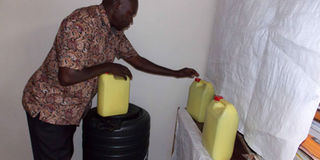Farmer turning banana to wine

Kamugisha checks some of the containers used for wine making. Photo by Michael J Ssali
What you need to know:
- Bananas are a delicate crop to farm because they can easily ripen and get spoilt. This is why farmers need to find ways to benefit from the crop through options such as making wine, writes Michael J Ssali
Eden Kamugisha, mainly a poultry farmer in Kisagazi Village, Mukungwe Sub-county, Masaka District, has been growing bananas for quite some time.
However, he realised that he had far too little control over his farm’s produce since he often had to sell the bananas at a loss, just to get rid of them before they ripened and became rotten.
“I worked with a lot of anxiety because if I had a lot of bananas on my farm, many other farmers also had plenty of them and it was difficult for me to set what I believed to be the right price for my bananas. I always considered the amount of money I invested in the banana plantation and I wanted to get it back, upon selling the bananas and to make some profit. However, often I made losses since the rest of the farmers sold their bananas at whatever price the unscrupulous traders offered and I also had to get rid of mine.”
Solutions that save the day
Today, it is a different story because Kamugisha does not have to sell his bananas at a give-away price just because they are perishable. He has gone into banana wine making and he no longer worries about the bananas ripening before he finds a buyer.
He is not quite willing to disclose all the details that he goes into to make his wine, but he says banana wine is easy to make.
In his estimation, by making wine a farmer could earn as much as Shs200,000 from a bunch of bananas which many other farmers sell at just Shs15,000 in the ordinary banana markets. “It can be steamed as food and sold at quite low prices. But we have to factor in the cost of the ingredients that one has to buy before obtaining the wine. However they cannot exceed 50 per cent of the total price at which the wine obtained from the banana bunch is sold.”
Currently, he has a buyer who takes the wine before it is bottled but he has a long term plan to engage in bottling the wine himself.
He prefers growing the Fear banana variety which he has inter cropped with coffee. “It is a variety that is fairly resistant to the Banana Bacterial Wilt and I am always assured of quite heavy bunches,” he says.
He mainly uses chicken droppings as manure for both banana and coffee.
Beer could be your option
Banana wine should never be confused with banana beer which is commonly referred to locally as tonto or mwenge bigere.
Banana wine is a clear, slightly sparkling alcoholic drink with a longer shelf-life than banana beer, which easily gets spoiled and can never be kept for a long period. It has a shorter making process and requires no more ingredients than perhaps roasted millet or sorghum flour.
To make banana beer, the ripe bananas (of known beer making banana
varieties) are usually peeled and mixed with grass and squeezed manually to get juice out of them. The juice is filtered and then diluted with water before being mixed with ground millet or sorghum and left to ferment for some 24 hours after which the banana beer (mwenge) is filtered for drinking.
Making the wine
The process for making banana wine is not complex at all as Eden Kamugisha explains.
“Just slice the ripe bananas up into small pieces. However, it is optional to slice the bananas. They may just be peeled. It is very important to select those without bruises or any other damage. The bananas must be well washed and clean. Depending on the size of your container, it is good to put twice the amount of water as the weight of the bananas. The water must be boiling hot by the time it is poured over the bananas. Then sugar is added to enhance sweetness.
Do some stirring. Add some yeast, then, citric acid, and sodium bazonate.
“Allow to cool, and cover the brew for some two and more months. Six months is good enough before bottling and passing out the final product as suitable wine for the market.”
It is good to ensure there is continuous production by initiating a wine making process perhaps everyday so that six years later every day, there is wine going to the market.




